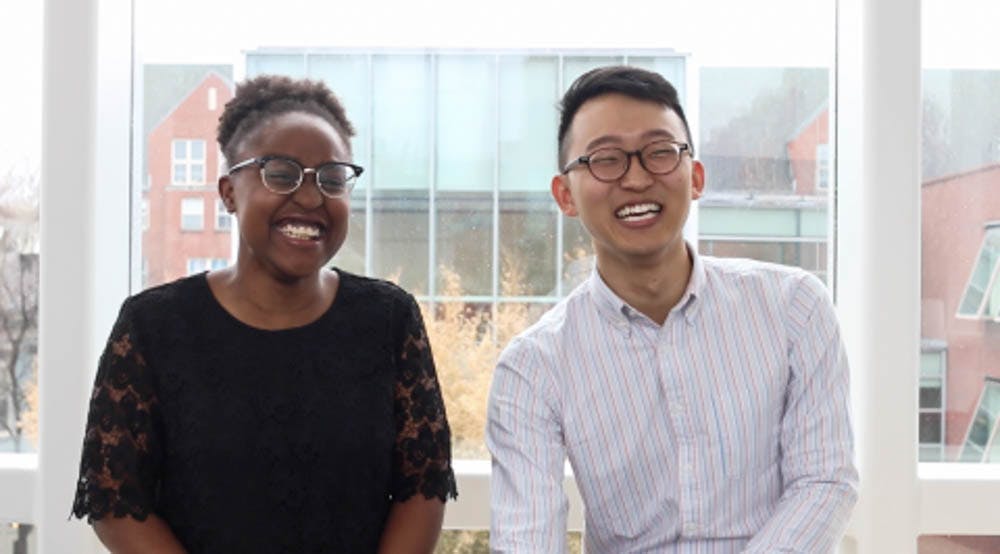Richard Park ’16 and Bella Okiddy GS are spearheading a biotech startup that aims to improve rape kit testing for victims of sexual assault. The pair received funding from the Swearer Center for Public Service’s Embark Post-Graduate Fellowship, a one-year stipend to pursue altruistic business ventures, earlier this year.
The startup, Technologies Against Assault, began in an entrepreneurship class that the two founders took last semester. Though both were interested in addressing the shortcomings of post-assault examinations, Park was particularly motivated to take on the project in light of his own sexual assault when he was 18.
“A lot of people have been touched by sexual assault, but they just don’t know it,” Okiddy said. “It affects everyone, even though we might not talk about it.”
Park said he hopes that TAA can improve the system for reporting sexual assault, which currently fosters the “idea that everything is on the survivor.” The startup’s technological approach aims to “ameliorate and alleviate a lot of these feelings,” he added.
Traditional rape kit examinations consist of several evidence-gathering steps. The victim first describes the details of the assault, which helps an examiner determine which of the victim’s affected areas to focus on. Any physical markings on the victim’s body are then photographed, and the victim’s clothes are collected. A professional then collects biological evidence from areas of possible contact on the victim’s body.
On average, a rape kit examination lasts between one and a half and two hours, said Erin Chesci, an adjunct professor at the School of Continuing Studies at Roger Williams University, survivor of sexual assault and advocate for sexual assault prevention. A victim must immediately relive every detail of his or her attack in order for hospital and investigation staff to gain as much information as possible for a case, she added.
Cheschi described her rape kit examination as “scary” and “long,” adding, “you felt like you were being assaulted all over again.”
The rape kits developed by TAA aim to streamline the testing process and reduce the invasiveness of the exams. By introducing new methods buttressed by biotechnology, TAA would lessen a victim’s subjection to the trauma of reliving an attack. Park and Okiddy said they could not divulge any specific information about the technology behind their startup, as their patent is pending.
Cheschi said that victims often feel confused after the rape kit examination has been conducted, as they are not informed as to whether any of the evidence collected will be useful to professionals for their case.
But TAA’s biotechnology would help to confirm whether or not evidence is substantive. In addition, the technology would help medical professionals determine which tests are necessary in order to reduce the number of tests a victim must undergo and prevent further trauma.
The kits “have the potential to allow a survivor to leave an examination with much more confidence and certainty in evidence collection,” Park said.
Park and Okiddy gained support for TAA from many faculty members, who encouraged them to apply for the Embark fellowship. They also hope to receive additional funding from the Rhode Island Business Plan Competition and MassChallenge, both of which support startup ventures. They have created a business plan for TAA and are in conversations with lawyers to patent their technology.
Park and Okiddy hope to obtain the necessary patents by graduation so that they can start publicizing TAA and prototyping their technology. This summer, the founders aim to further develop their technology and organize a management plan for TAA, which includes earning U.S. Food and Drug Administration approval by 2017.
TAA will require an initial $75,000 to maintain its current growth rate, and within the lifespan of the company, Park and Okiddy estimate that they will need to raise about $2 million. The founders will use donations obtained on Indiegogo, as well as other private contributions, to raise the bulk of their funding in the early stages of the company.
Through Brown, TAA has been able to develop an amicable relationship with Rhode Island hospitals and police, and its founders hope that Rhode Island will be among its first customers. Park and Okiddy hope their startup’s success in Rhode Island will allow it to spread to other hospitals in New England and eventually the rest of the country.
Cheschi said that TAA will assure victims that undergoing a rape kit examination is worthwhile given the increased potential for evidence collection. “It may prompt more victims to at least get a rape kit done,” she added.





